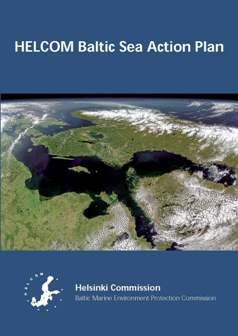Press release
Full version of the HELCOM Baltic Sea Action Plan published
 Helsinki, 21 December (HELCOM Information Service) – The Helsinki Commission today announced the publication of the full version of the Baltic Sea Action Plan, which was adopted by the coastal countries at the HELCOM Ministerial Meeting on 15 November 2007 in Krakow, Poland. The action plan sets an ambitious target of ceasing all pollution and achieving by 2021 a good ecological status of the Baltic Sea - a sea with diverse biological components functioning in balance and supporting a wide range of sustainable human economic and social activities. This programme of actions to restore the health of the sea is also the first attempt by a regional marine protection convention to implement the ecosystem approach defined by the 1992 Rio Declaration and the 2002 World Summit on Sustainable Development in Johannesburg.
Helsinki, 21 December (HELCOM Information Service) – The Helsinki Commission today announced the publication of the full version of the Baltic Sea Action Plan, which was adopted by the coastal countries at the HELCOM Ministerial Meeting on 15 November 2007 in Krakow, Poland. The action plan sets an ambitious target of ceasing all pollution and achieving by 2021 a good ecological status of the Baltic Sea - a sea with diverse biological components functioning in balance and supporting a wide range of sustainable human economic and social activities. This programme of actions to restore the health of the sea is also the first attempt by a regional marine protection convention to implement the ecosystem approach defined by the 1992 Rio Declaration and the 2002 World Summit on Sustainable Development in Johannesburg.
The 103-page plan consists of nine major parts, as well as a set of supporting HELCOM Recommendations and other documents. The first is a preamble, explaining the plan’s purpose and describing its core policy, which is based on the application of the innovative ecosystem approach to environmental management. It is followed by four segments, describing measures to solve all major environmental problems affecting the Baltic Sea - to curb eutrophication, prevent pollution involving hazardous substances, improve maritime safety and accident response capacity, and halt habitat destruction and the decline in biodiversity. Each of the four segments contains 1) a short description of the problem area; 2) a listing of the ecological objectives and indicators with target levels used to monitor and evaluate the implementation of the plan; 3) a set of actions needed to achieve the desired state of the marine environment. The next major parts of the plan detail an evaluation mechanism to measure the implementation status of the actions and a review mechanism for the plan itself, as well as describe actions for awareness raising and capacity building and financing. One of the major highlights of the new plan is that it opens a new era in marine environment protection by including the concept of maximum allowable nutrient input. It also contains provisional country-wise annual nutrient input reduction targets for both nitrogen and phosphorus.
The HELCOM Baltic Sea Action Plan has already been widely supported by politicians at various forums, and heralded as a pilot project for European seas in the context of the proposed EU Marine Strategy Directive. The European Community has described HELCOM’s plan as a cornerstone for further action in the Baltic Sea region, emphasizing that the plan is instrumental to the successful implementation of the proposed EU Marine Strategy Directive in the region.
The proposed EU Marine Strategy Directive foresees such an action plan for each eco-region, including the Baltic. HELCOM is in a unique position to deliver this already, given its embracing of all the countries in the Baltic Sea catchment area. HELCOM is also in a unique position to ensure that the special characteristics of the Baltic Sea are fully accounted for in European policies. As a pioneer in the application of the ecosystem approach, the innovative HELCOM action plan will also serve as a model example to be followed by the Regional Seas Conventions and Action Plans under the auspices of the UNEP Regional Seas Programme.
Note to Editors:
The Helsinki Commission, or HELCOM, works to protect the marine environment of the Baltic Sea from all sources of pollution through intergovernmental co-operation between the countries bordering the sea - Denmark, Estonia, Finland, Germany, Latvia, Lithuania, Poland, Russia, Sweden, and also the European Community.
HELCOM is the governing body of the "Convention on the Protection of the Marine Environment of the Baltic Sea Area," more usually known as the Helsinki Convention.
For more information, please contact:
Mr. Nikolay Vlasov
Information Secretary
HELCOM
Tel: +358 (0)207 412 635
Fax: +358 (0)207 412 639
E-mail: nikolay.vlasov@helcom.fi

